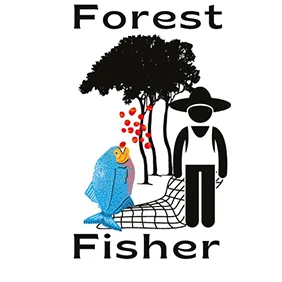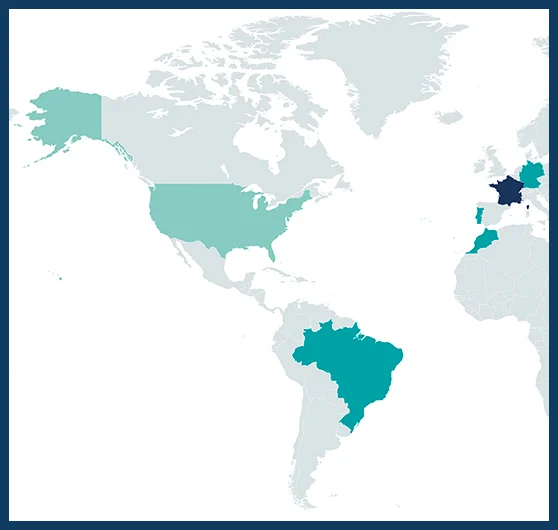
01.04.2022 – 01.04.2025
€ 780,638
Pablo TEDESCO
pablo.tedesco@ird.fr
Coordinator: Evolution and biological diversity (EDB), IRD/CNRS/University of Toulouse 3 Paul Sabatier, Toulouse, France
Ecology, Federal University of Goiás, Goiânia, Brazil
Education, Agriculture and Environment, Federal University of Amazonas, Humaitá, Brazil
Biology, State University of Maringá, Maringá, Brazil
Biology, State University of Mato Grosso do Sul, Mundo Novo, Brazil
Ação Ecológiga Guaproré, Porto Velho, Brazil
Biology, Federal University of Rondônia, Porto velho, Brazil
Research & Development, Brazilian National Monitoring Centre for Alters and Natural Disasters, São José dos Campos, Brazil
Land Management, Technical University of Munich, Munich, Germany
Mountain Investigation, Polytechnic Institute of Bragança, Bragança, Portugal
Wildlife, Fisheries, and Aquaculture, Mississippi State University, Starkville, United States of America

The Amazon River Basin is the largest and most diverse drainage basin on the planet. The deforestation of Amazonian tropical forests to make way for crops and pastures has increased dramatically over the last decades, along with changes in climate parameters increasing the frequency of extreme hydrological events and droughts. Such changes coupled with the physical fragmentation of rivers are affecting distribution patterns, recruitment, and productivity of freshwater fish species, thus reducing a variety of livelihood options for fishing communities. Among Amazonian fishes, those with fruit-eating habits play a crucial role in maintaining forest diversity as seed dispersers and constitute a key source of food and income for traditional, local human populations. Increased deforestation, especially in riparian areas, has threatened this fundamental plant-animal interaction relevant to the maintenance of the biological and functional diversity of plant communities and ecosystems in lowland rivers. Important socio-economic impacts are to be expected because numerous frugivorous fish species are harvested by traditional riverine communities and support commercial fisheries. ForestFisher aims to integrate forest-fish interactions in the context of planning new protected areas, managing existing conservation networks, and designing restoration programmes in the Amazon River Basin.
The main research questions addressed by ForestFisher are:
- How recent land-use changes have affected the frugivorous fish diversity? Here ForestFisher will assess the influence of recent floodplain forest structure changes (e.g., degree of riparian deforestation) on frugivorous fish diversity at local and regional spatial scales.
- Will climate, land-use, and river fragmentation changes affect the availability of suitable areas for frugivorous fish species, and thereby threaten the ecosystem services that these fish populations provide? Here land use and land cover models will be developed for future scenarios, linking land-use change, landscape patterns, and ecosystem services critical for land management and policymaking. Then priority areas for conservation of frugivorous fish species will be selected, mapped and ranked based on the likelihood of areas to retain climatically suitable conditions for species in the face of expected changes in climate, land use and land cover, and fragmentation.
- How will climate-change driven shifts in the distribution of frugivorous fish species affect fishing communities and their traditional fishing grounds? ForestFisher will build a protocol that guides public policy- and decision-makers to design Fishery agreements aimed at preserving a fishing resource that faces potential damages from the multiple threats.
ForestFisher aims to identify priority areas for conservation and restoration of Amazonian forest- frugivorous fish interactions and related ecosystem services. Climatically suitable areas for frugivorous fish species, riparian vegetation, connectivity will be integrated within the hydrographic network, and the location of current fishing grounds to define conserved and degraded climatic refugia, and infer the needs of potentially displaced fisher communities.
The Amazon is at the centre of an ongoing intense international debate as highlighted in the recent COP-26 and ForestFisher will offer an approach to assess the combined effects of multiple threats on fish species. Fish species are essential to the functioning of a socio-economic system, as they offer food and income for indigenous peoples and local communities, and to the ecological processes needed for forest sustainability. From this assessment, and the inclusion of stakeholders (e.g. the Brazilian National Centre for Monitoring and Alerts of Natural Disasters, the NGO Ecoporé) and fishing communities, the project will finally offer an integrated strategy for the conservation and restoration of priority areas, contributing to successful mitigation of current and future changes and to the resilience of socio-ecological systems in the region.
At least 1 million people are directly linked to artisanal fishing in the Brazilian Amazon. Fishes’ future suitable climatic areas may become decoupled from the current location of the fishing communities, implying future food insecurity and migrations in search of better fishing grounds. This project intends to develop a participatory protocol for the conservation of fishing resources and climate refugia in the Madeira / Purus interfluvial region. This protocol will guide local/ regional public policy and decision makers to design Fishery agreements based on the scientific evidence produced by the project and the traditional knowledge brought by fisher communities.
ForestFisher focuses on the Amazon drainage basin at different scales and extents and on local scale fish communities from sites covering a gradient of deforestation levels in the whole Amazon drainage. This compilation of fish sampling sites will be related to landscape metrics calculated from MapBiomas Panamazonian Collection, ensuring a complete coverage of the fish diversity dataset compiled. At the scale of the whole Amazon Basin, ForestFisher will provide future scenarios, model-based projections and priority areas for conservation and restoration of riparian forests to sustain frugivore fish populations and related fisheries. These outputs will be also provided for the Madeira/Purus interfluvial region, building participatory scenarios of future Amazon land-use change. Finally, stakeholders will be engaged in extensive pilot areas within the Madeira/Purus interfluvial region to develop a protocol for digital, economic and social inclusion of local communities living on fisheries.
- Agence Nationale de la Recherche (ANR), France
- Fundação de Amparo à Pesquisa do Estado do Amazonas (FAPEAM), Brazil
- Fundação de Apoio ao Desenvolvimento do Ensino, Ciência e Tecnologia (FUNDECT), Brazil
- VDI/VDE-IT, Germany
- Fundação para a Ciência e a Tecnologia(FCT),Portugal